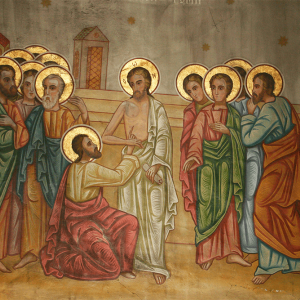
Austen Hartke is the author of Transforming: The Bible and the Lives of Transgender Christians, a book on theology and personal narratives published by Westminster John Knox Press in 2018. He is also the founder and director of Transmission Ministry Collective, an online community dedicated to the spiritual care, faith formation, and leadership potential of transgender and gender-expansive Christians. Austen is a graduate of Luther Seminary’s Master of Arts program in Old Testament/Hebrew Bible Studies and is the winner of the 2014 John Milton Prize in Old Testament Writing from the same institution. From 2015 to 2018 he created one hundred videos for the Transgender and Christian YouTube series, which sought to share parts of the Bible that relate to gender identity and the lives of transgender individuals. As a transgender person of faith, Austen's greatest passion is helping other trans and gender-expansive people see themselves in scripture. You can learn more about Austen and his work at austenhartke.com.
Posts By This Author
The Disciples Were Terrified on Easter. Trans People Can Relate
So when I read about people like Katie, one of many affirming parents who are leaving Texas because of the threat of having their transgender child taken from them, I think of the way the women at the tomb fled in fear. And when I hear Maddie, a trans girl in North Carolina, say, “If I didn’t have my hormones or my [puberty] blocker, I’d be very unhappy, and I wouldn’t want to leave the house sometimes,” I think of the disciples with the door locked on Easter evening.
Will Christians Stand Up for Transgender Inmates?

Image via Nicholas Kwok/Unsplash
Christian ministries have been a part of the prison reform movement for decades, and Barna polls like the one conducted by Prison Fellowship tell us that 89 percent of practicing Christians agreed with the statement, “It’s important that prison conditions are safe and humane, specifically because I believe every person has intrinsic value and worth.” Our Christian belief that every single person bears the image of God within them informs the actions we take to support each other.
6 Common Ways Christians Stereotype Transgender People
Many people will be familiar with this explanation of trans identities — that trans people identify as “a girl trapped in a boy’s body,” or “a boy trapped in a girl’s body.” This narrative is a simplistic one, and we most often see it used by gender-diverse children as they’re exploring their sense of self. As kids, we don’t have a better way of explaining how we feel, and so we use these words to try to get across the fact that there’s something about us that you can’t see. But for many trans people, especially nonbinary trans folks, this narrative doesn’t work.
Just As I Am
"I can’t fathom trying to do this without my faith.” For M Barclay, currently on the path to ordination, faith has never been the problem. For Barclay, the biggest barrier to Christian life hasn’t been belief, science, secular culture, or even their own gender identity. The stumbling block, at every point, has been the church.
Like many transgender Christians, Barclay has been told that their gender identity is sinful, that their faith is not valid, and that they should not be called to ministry or involved in Christian life unless they “repent.” (Barclay, who does not identify as strictly male or female and uses the pronouns “they” and “them” for self-reference, has intentionally chosen their name, M, for its gender neutrality.)
Whether we know it or not, transgender people are already a part of our church communities. As of 2016, at least 1.4 million adults in the U.S. identify as transgender, and 66 percent of trans people have been a part of a faith community at some point in their life. Unfortunately, 1 in 5 trans people of faith reported leaving their faith community due to rejection.
Still, some trans Christians find the strength to stay.
7 Things the Largest-Ever Survey of Transgender People Tells Us About Our Churches
This week the National Center for Transgender Equality released the findings from the 2015 U.S. Transgender Survey — the largest survey examining the experience of transgender people in the United States ever completed. The survey examined the experiences of nearly 28,000 people who identify as transgender, nonbinary, genderqueer, agender, or who use another term beneath the transgender umbrella.
The people who chose to take part in this landmark survey answered questions about everything from experience with harassment in bathrooms, to level of acceptance from family members, to interactions with law enforcement, to party affiliation and employment status. Although only seven questions on the survey directly address religion and engagement with faith communities, the data presented in the final report can help America’s churches live into their calling as true sanctuaries. People of God, are you listening?
7 Answers to Questions About Transgender Realities
Many Christians today have transgender friends and family members that they’d like to support, but they feel conflicted and confused about the details. Jesus calls us to welcome the stranger, and that means opening our hearts and our doors to people we don’t understand. At the same time, it’s all right to have questions! The act of seeking understanding often leads to increased compassion and empathy for others.
Standing Up For Transgender Neighbors

Image via jeep2499/Shutterstock.com
For those of us who live outside South Dakota, these issues may seem too far-removed to touch our lives in a meaningful way. But in the Bible we find that our neighbors continue to be our neighbors, regardless of how far away they live. As Christians, we are called to love and work for the good of our neighbor, and as followers of Jesus we are called to protect the most vulnerable. Surely there must be a way to ensure the safety of all of the children in South Dakota’s school system, and not just the majority.
7 Things the Transgender People in Your Congregation Wish You Knew
As I spoke to other transgender Christians, I found that many expressed frustration with the lack of education on trans issues in their churches. They told me that even though trans people are being recognized in the media, real and relevant conversations are just not happening in the sanctuary or at Bible study. Maybe folks are worried about saying the wrong thing, or perhaps our churches don’t make space for discussion. Whatever the reason, we as Christians are called into fellowship with one another, and real fellowship takes education and communication. In that spirit, here are seven things that transgender people in your congregation wish you knew.





